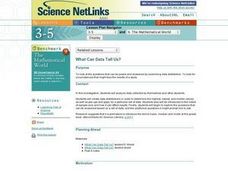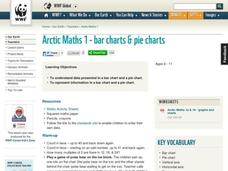Baylor College
Using Food Labels
Help your class make sense of nutrition labels with the ninth lesson of this series. After explaining the different information provided on packaged food labels, perform an activity that demonstrates the amount of sugar in a single can...
Berkshire Museum
Adopt a Schoolyard Tree
Help young scientists connect with nature and learn about trees with a fun life science lesson plan. Heading out into the school yard, children choose a tree to adopt, taking measurements, writing descriptions, and drawing sketches of it...
Teach Hub
Super Bowl Classroom Activities
Need some help getting young football fans to focus on something besides the Super Bowl? Use a list of football-themed activities for art, math, science, nutrition, language arts, and social studies to get their heads in the game!
National Security Agency
Place Value - Butterflies Floating Place to Place
Learn about butterflies and place value in a series of interdisciplinary lessons! With several worksheets that reference butterfly facts in word problems, kids can practice science and math in one activity. Additional worksheets are...
Curated OER
What Can Data Tell Us?
Students explore data distribution. For this data analysis lesson, students create a data distribution table by playing the game "Tower of Hanoi" from the Hall of Science. Students analyze their data and answer data driven questions.
Curated OER
Using Bar Graphs
What's your favorite pizza topping? Scholars analyze two bar graphs, one depicting a math club's favorite pizza toppings and the other ice cream sales per flavor. As they examine the graphs, learners answer a few comprehension questions....
Baylor College
How Much Water Do Humans Need?
Physical or life science learners measure the amounts of water eliminated by intestines and the urinary system, and the amounts lost via respiration and perspiration. In doing so, they discover that the body's water must be replenished...
Baylor College
Plant Parts You Eat
Plants provide a variety of delicious foods essential for human survival. In the fourth lesson of this series on food science, young scientists investigate common fruits, vegetables, and grains in order to determine which plant part is...
Baylor College
Bio Build-up
Trace pollutants through the environment in the seventh lesson of this series on the science of food. Looking at a picture of the plants and animals in an aquatic ecosystem, learners use dot stickers to represent harmful chemicals as...
Baylor College
They're Everywhere: Bacteria
Totally gross out your class with the eighth lesson in this series on food science. Explore the microscopic world of bacteria by taking swabs of different classroom objects and growing colonies in petri dishes. An engaging activity that...
Baylor College
What's That Food?
Get things cooking with the first lesson in this series on the science of food. Working in small groups, young scientists make and record observations about different mystery foods. These descriptions are then shared with the class and...
Baylor College
Healthy Snacks
Assess your pupils' ability to identify healthy food choices in the final lesson of this series on food science. Given five different food labels, young nutritionists will rank them from most to least healthy, supporting their choices...
PBS
Frame Yourself: Area and Perimeter
Elementary schoolers are arranged in pairs and view the video Math Works: Measurement: The Difference Between Perimeter and Area. They discuss any prior knowledge they have of the term perimeter and then brainstorm together what the...
Curated OER
Are You Full of Hot Air?
Explore the concept of measuring and recording circumference. In this physical science and measurement lesson, young learners blow up balloons, measure the circumference, and record the data on an interactive graphing website.
Alabama Learning Exchange
Place Value Review
Here is a fast-paced addition game which reinforces the concept of place values. Learners view a PowerPoint on place value, then engage in the game using a whole-class format. This is a stimulating, and interesting math game lesson.
Curated OER
Benefits of Indoor Plants
Students diagram a plant. In this Science lesson, students explore the concept of photosynthesis focusing on the oxygen production. Students calculate the amount of plants needed to filter the air in their classroom.
Curated OER
Modeling the Solar System
Students build a scaled model of the solar system. In this space science lesson, students arrange them according to their distances from the sun. They analyze each planet's unique features such as density and relative gravity.
Laboratory for Atmospheric and Space Physics
Where Are We Going?
Come take a ride on the space bus! Scholars go on an imaginary trip to pick up their peers from the inner and outer planets while reinforcing math skills. First, learners round decimals to identify each planets' distance from Earth....
Curated OER
Multiplying With Nine As A Factor
Elementary math minds complete various activities to memorize the multiples of nine. They watch a PowerPoint presentation and demonstrate the finger trick. Unfortunately the link to the multiplication activities does not take you...
Curated OER
Bubbles Galore
Students investigate bubbles. In this science lesson, students observe how long bubbles last and graph the results of the experiment.
Curated OER
"Polly"gon Pockets
Explore polygons with your elementary learners. Divide the class in 12 to configure the polygon puzzle before them. They list the attributes of each type of polygon they see, and if there's time, they jump on the interactive website...
Curated OER
Lesson Design Protocol: Add and Subtract
Addition and subtraction are studied in this math activity. Upper graders add and subtract whole numbers up to 1,000 with and without regrouping.
World Wildlife Fund
Bar Charts & Pie Charts
Learn about life in the Arctic while practicing how to graph and interpret data with this interdisciplinary lesson plan. Starting with a whole group data-gathering exercise, students are then given a worksheet on which they analyze and...
National Security Agency
Time After Time
Save those precious minutes and hours spent planning math lessons with this mini-unit on telling time. Offering a series of engaging hands-on and collaborative learning activities, these three lessons teach children how to read...
Other popular searches
- Math and Science
- Math and Science Careers
- Integrated Math and Science
- Science/ Math Games
- Math and Science Activities
- Integrating Math and Science
- +Math and Science Careers
- Math and Science Plan
- Math in Science
- Math Science
- Math and Science Lessons
- Math and Forensic Science























